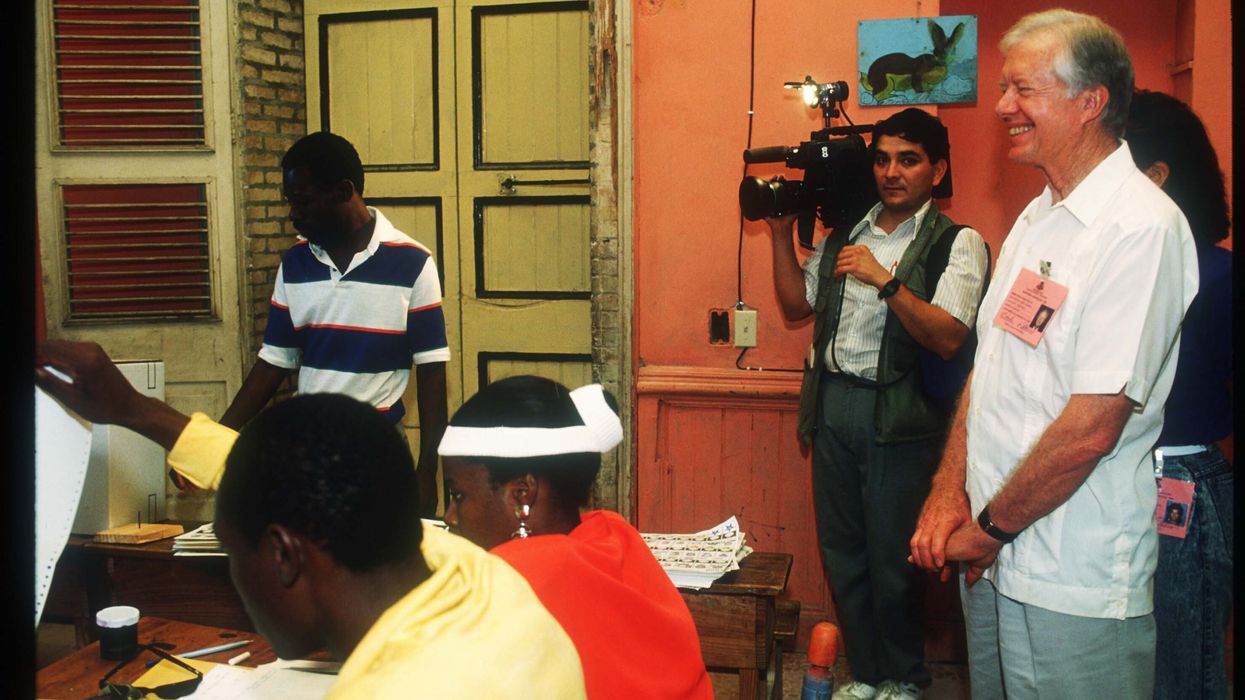Merloe provides strategic advice on elections and democracy in the United States and internationally. He worked with former President Jimmy Carter on elections and democratic transitions on four continents.
On Oct. 1, President Jimmy Carter turns 100 years old. According to reports, he is concerned about the dynamics surrounding the 2024 election and hopeful that the United States will turn the page. That is no surprise given his devotion to this country and his dedication to fostering genuine elections around the world.
He first observed a foreign election in 1989 as co-leader, with former President Gerald Ford, of the joint international election observation mission to Panama organized by the nonpartisan National Democratic Institute and what is now the International Republican Institute. His role in helping to expose Manuel Noriega’s attempted fraud in that election had profound effects in Panama and inspired Carter to do more. Often working with NDI, he guided The Carter Center into the forefront of international election observation in Africa, Asia, Latin America and the Middle East.
In my role of almost three decades leading NDI’s international election programs, I had the honor of working closely with Carter in numerous elections. I witnessed him bring together for the first time in years the two antagonistic leaders of Bangladesh and negotiate their renouncing violence in an upcoming election. I saw him help Liberia’s contentious presidential candidates accept electoral results. He brought international attention to the credibility of Palestinian elections and promoted confidence in Peru’s post-Fujimori elections when public trust was fragile.
His successful bridge building in such hyper-polarized circumstances was aided by his reputation for listening, analyzing and offering recommendations based on ethical principles, rather than an advantage of the moment or some personal transactional consideration. In 2005, Carter joined NDI’s then board chair, Madeleine Albright, and other dignitaries at a commemoration led by U.N. Secretary General Kofi Annan to launch the Declaration of Principles for International Election Observation, which is now endorsed by more than 50 international organizations in an ongoing implementation process that guides their work.
In keeping with that spirit, on the International Day of Democracy (Sept. 15.), five leading organizations — International IDEA, The Carter Center, NDI, the International Foundation for Election Systems and the Kofi Annan Foundation — launched the Model Commitments for Advancing Genuine and Credible Elections. The commitments, already supported by nine other key international organizations, provide a basis for dialogue around safeguarding and improving electoral processes in any country — including in the United States. While the urgent challenges of securing election administration, protecting the right to vote, addressing disinformation and potential disruptions, plus curtailing threats and potentials for political violence are of immediate concern to countries heading to elections, the commitments provide a wider context.
As one of the people involved in developing the declaration of principles and the model commitments, I can attest that they were inspired by the examples set by Jimmy Carter, Kofi Annan, Madeleine Albright and so many others who dedicated themselves to bringing about genuine elections and advancing democracy.
On the occasion of his 100th birthday it is fitting to shine a bright light on this aspect of President Carter’s rich legacy of accomplishments in this country and around the globe. Hopefully, we will amplify his legacy as we move ahead, both here and abroad.




















Trump & Hegseth gave Mark Kelly a huge 2028 gift